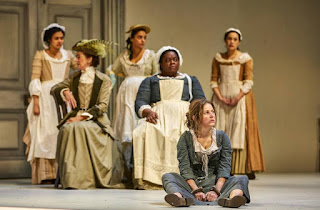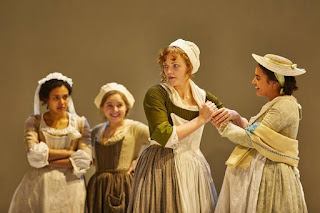Reviewing Anthony Page's Royal Court production of Uncle Vanya in 1970, Martin Esslin pointed to "the strange and marvelously productive affinity between the British and Chekhov", suggesting that "the country house civilization which Chekhov portrays, with its house guests, its boredom and its frustrations... closely resembles the country house life of the English middle classes until not so long ago, and in some ways to this day."
Esslin might have also given special attention to the relation between the Irish and Chekhov, since my two encounters with Uncle Vanya on stage have come via translations by Irish playwrights: first, Brian Friel's version for Sam Mendes at the Donmar Warehouse in 2002 and now Conor McPherson's new take, directed by Ian Rickson, which has just opened at the Pinter Theatre.
The play retains its original setting here, but the production boasts a stealth Irishness too, evident not only in McPherson's dialogue rhythms but also in the casting, with Ciarán Hinds playing the pompous prof and Dearbhla Molloy as his devoted mother-in-law.
McPherson's version has some infelicities: the drunken nighttime revels scene is funny but slightly overdone, and the use of a phrase like "wanging on" may be (just about) acceptable once, but not twice, and certainly not delivered by two different characters. But the production gets the ever-shifting Chekhovian flow of laughter to tears right, and the themes of unrequited love and disappointment emerge vividly and without ponderousness. Confrontations give way to embraces, mundanity intrudes into the philosophising, and the production preserves the compassion and humanism of Chekhov's vision, with each character given their measure of pathos, absurdity and awareness.
There have been more poignant Vanyas than the impish Toby Jones; in an effort not to sentimentalise the character he seems to have robbed him of some of his tragic stature. But Jones certainly conveys Vanya's bitterness and resentment at the waste that he's made of his life: which he lays at the Professor's door. A commanding Richard Armitage does well with the contradictary qualities of Astrov - his obliviousness to Sonya's devotion, his cynicism, his surge of sexual passion for Yelena - and he makes the vegetarian character's ecological concerns (a prescient part of the play if ever there was one) urgent and compelling.
As Nana, the magnificent Anna Calder-Marshall (who played Sonya in the 1970 production that Esslin reviewed) makes every look and line, however throwaway, count. "Do you remember?" she asks Vanya and the remark reverberates thanks to her beautiful voice. Some of the biggest pleasures of the production come in watching Calder-Marshall interact with Peter Wight, whose garrulous Telegin - describing how his wife left him a day after their wedding - strikes just the right notes of silliness and melancholy.
The older actors' beautiful ease makes Aimee Lou Wood's performance as Sonya look especially effortful; Wood has some touching moments, but others that are shrill or amateurish, and a lack of rapport between her and Jones is a weak spot that makes the ending less moving than it should be. Wood seems much more secure with Calder-Marshall and Rosalind Eleazar. I wasn't sure about Eleazar as Yelena at first either, but the performance warms up as the actress powerfully reveals the character's sense of entrapment and frustration. Enhanced by a beautiful country house design by Rae Smith, and by Bruno Poet's lighting, the production is already in strong shape and looks likely only to deepen as the run progresses. Overall, it's a Chekhov to cherish.
Uncle Vanya is booking at the Harold Pinter Theatre until 2 May Further information here.
Images: Johan Persson

















